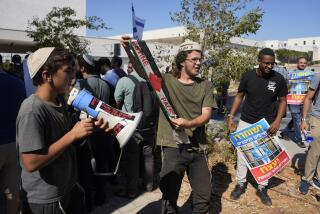Rape claim threatens Iraq security plan
BAGHDAD — On Iraqi television screens this week, two visions of the Baghdad security plan flickered in people’s living rooms.
Al Iraqiya, the station controlled by the Shiite-dominated government, showed Iraqi soldiers and police patrolling calmly and searching cars for weapons, as Baghdad residents spoke approvingly of the newly safe streets.
On the Sunni-controlled stations such as Al Sharqiya and Baghdadiya, a 20-year-old Sunni Muslim woman calling herself Sabreen, with dark scarves covering all but her teary eyes, recounted how three Iraqi police officers raped her.
When U.S. and Iraqi forces planned their renewed security effort in Baghdad, they anticipated attacks from suicide bombers, mortar fire and sectarian gunmen. But this week they are confronting a more formidable threat: the fallout from Sabreen’s claims.
The charges are strongly disputed by Iraqi authorities. But regardless of their veracity, the assertions threaten to turn people against the security crackdown, which is as dependent on public perception as it is on supremacy on the streets.
The claims reinforce the view held by some Sunni Muslims that the security plan, far from an evenhanded effort to restore peace, is being executed by militia members determined to extend Shiite Muslim dominance in the new Iraq.
Already, many Iraqis are wondering why Sunni strongholds have been among the first targets of the security effort, but Sadr City, the neighborhood that is home to some of the most militant Shiite fighters, has been virtually untouched.
“Iraq has become the theater for conflict between regional and international entities, and the only victim is an innocent Iraqi citizen,” Sheik Abdel Nasser Janabi, a member of a largely Sunni bloc in parliament, said at a news conference Wednesday. “The ongoing incidents bring to light the fact that there are dirty hands within the security plan.”
Ahmed Abdel Ghafour Samaraie, the head of the Sunni Endowment, said the rape allegation showed that U.S. and Iraqi forces had not gone far enough to purge thugs from the security forces. “I think the Baghdad security plan in the beginning was good, but the negative aspect is that the militias are penetrating these forces,” he said.
On Wednesday he called for an international investigation of the rape allegation. By the end of the day, he was fired from his post by Iraqi Prime Minister Nouri Maliki, a Shiite. Samaraie disputes the prime minister’s authority to fire him.
In Iraq, rape is a subject so taboo that victims rarely report the crime. But word of its use as a weapon in the war is often whispered about. In some cases, women who acknowledge being raped have been disowned or killed.
“In a country like Iraq, where personal honor and dignity play an important role, perhaps more decisive than any political issue, I think it is a very important and significant issue in this security operation,” said Wamidh Nadhmi, a political analyst and professor at Baghdad University.
U.S. officials took pains Wednesday to distance themselves from the case. In a news conference, Army Maj. Gen William B. Caldwell IV, the chief military spokesman in Iraq, said the matter was for the Iraqi government to deal with. “It does not imply anything about the multinational force,” he said.
The story, as it has emerged in the media in recent days: Iraqi police searched the woman’s home Sunday, then took her to a police station for questioning on whether she had aided insurgents.
That evening, she sought treatment at Ibn Sina Hospital in Baghdad, which is staffed by U.S. military medics. She was treated and released Monday morning.
On Monday, the satellite television channel Al Jazeera started airing an interview with the woman in which she recounted details of the alleged rape, including a claim that a police officer told her, “We take whatever we want, and we kill whomever we do not want,” as she begged for her release.
Brig. Gen. Qassim Musawi, an Iraqi military spokesman, dismissed the woman’s allegation, saying she was suspected of working with insurgents and had been seen on one occasion cooking for “at least 10 men.”
Other Iraqi authorities claimed the officers involved were Sunnis. Iraqi security officials said U.S. troops were present during the interrogation, which did not last more than 15 minutes.
The accused officers were cleared after a one-day investigation.
Iraqi officials released the woman’s name and identifying details about her.
A key discrepancy has emerged over the woman’s medical report.
Musawi said the report, taken by American doctors, concluded that no sexual assault had occurred. But U.S. officials said they had not released the report and would not do so unless there was a legal proceeding.
In the furor that has followed, people’s faith in the story has largely come down to whether they are Shiite or Sunni.
“We reject any case like this; we do not accept it,” said Sheik Hamid Moalla, a member of the Supreme Council for Islamic Revolution in Iraq, part of the largest Shiite voting bloc in parliament. “I think most of the Iraqis are upset and disgusted by this process of trading the honor and the reputation of Iraqi women.”
Samaraie, the Sunni Endowment official, said: “I would like to tell you that it’s not just allegations. The rape took place; it happened. We consider that the rape incident is a major crime. And what’s worse than that is that Maliki honored the criminals.”
*
christian.berthelsen@latimes.com
Times staff writer Borzou Daragahi in Baghdad contributed to this report.
More to Read
Sign up for Essential California
The most important California stories and recommendations in your inbox every morning.
You may occasionally receive promotional content from the Los Angeles Times.










